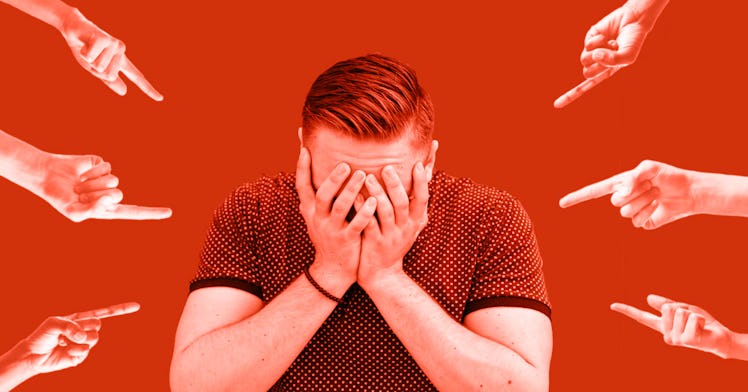Why Parent Shaming Hurts So Bad And Can’t Be Avoided
Shame effects the body and brain the same way stress, anxiety, and depression do, but it's more difficult to address — and much easier to pass on.

Shame is a uniquely painful emotion. Unlike guilt, which is linked to specific actions and therefore serves as an effective behavior modification tool, shame is universal. It makes us feel bad about ourselves as people in ways that can lead to self-harm and severe physical effects. When someone feels shame, their heart rate increases, their body temperature elevates, and their muscles contract. Shame-filled people lose sleep and their appetites, becoming irritable, sick, and prone to drug and alcohol abuse. This is all very bad news for parents of young children, who research suggests are neurologically vulnerable to feelings of shame during the first two years of their children’s lives. Why are we wired this way? Because we inherit our shame and because we’re all too willing to entertain the notion that we’re bad parents.
“Shame is different from other feelings such as embarrassment because shame makes the individual feel that he or she is not acceptable or worthy as a human,” says clinical psychologist Dr. Carla Manly. “Embarrassment and guilt, on the other hand, give the message, ‘I did something off or socially unacceptable.’ If left unchecked, shame can become a truly destructive core belief.”
Guilt and embarrassment occur in the amygdala and insular cortex and shame in temporal and frontal lobes. Shame, on the other hand, is difficult to pin down because it mimics stress, anxiety, and depression in physical and psychological symptoms. Despite the fact that people feel physical and emotional pain from it, shame can’t be cured completely because it is deeply rooted in attachment deficits formed in early childhood. In other words, it’s chronic and often progressive. When children’s earliest emotional needs are not met, necessary neural connections in their growing brains are not met either and they develop insecure attachment styles. These individuals go through life with the inexplicable feeling that there’s something wrong with them that everyone can sense, but they cannot fix.
“People whose shame is rooted in childhood are often hypersensitive to the impact parental mistakes can have on children,” explains Dr. Nicki Nance, a psychotherapist and professor at Beacon College in Florida. “When their children reach the age that they first experienced it, dormant shame can be triggered.”
Since there’s no such thing as a perfect parent or childhood, anyone who’s not a sociopath has some shame. But parents experience a disproportionate amount. That’s because there’s no such thing as a perfect parent and parenting is such a high-stakes endeavor. Parents with insecure attachment might be hyper-aware of the risk of raising kids that suffer from the same feelings of inadequacy. The problem is that when they inevitably overcorrect, they feel shame for going too far. It’s an impossible situation. And it leads parents into a trap: They wind up modeling shame-based behaviors for their kids instead of insulating them from them.
In short, shame around parenting makes it hard for parents to move past the mistakes made by their parents, fueling an unfortunate cycle for families with chronic shame.
Like goldfish crackers in a minivan, parent shame is pretty much everywhere. Celebrity moms and dads experience it on Instagram every time their infant sleeps the wrong way or their toddler winds up covered in chocolate. Moms and dads who aren’t famous also shame each other at the park, in school, inside online parenting groups, or in passing. Think of all those off-handed remarks, those “Oh, that’s interesting” reactions to parenting strategies. As the singer Pink has pointed out to her myriad and occasionally opinionated followers, plenty of parent shaming comes from people who are not experts on parenting and are often not parents themselves. Don’t believe her? Bringing an upset baby on an airplane. Passengers will act like it’s a snake.
Manly and Nance agree that the best thing parents can do is recognize when they’re feeling shame. Having identified the feeling, they should remind themselves that it’s universal. Everyone feels shame; it is just triggered in different ways for different people. This doesn’t protect parents from the feeling, but it hopefully stops them from making that feeling apparent to their children and thus continuing an inter-generational vicious cycle.
Still, it’s hard. Parents fail every day. And that failure piles up in ways that can alienate fathers and mothers from themselves. Handling shame responsibly takes real work — and practice. It also may require parents to push back when someone attempts to shame them or to remove negative people from their life.
“Being shamed about one’s parenting skills hits at the core of the ability to perform one of the most meaningful tasks in life-raising one’s own child,” Manly says. “Shaming comments can take parents straight into the realm of believing that they are bad as individuals — rather than the truth that parenting is not a science, but a practice of learning and growing over time.”
This article was originally published on